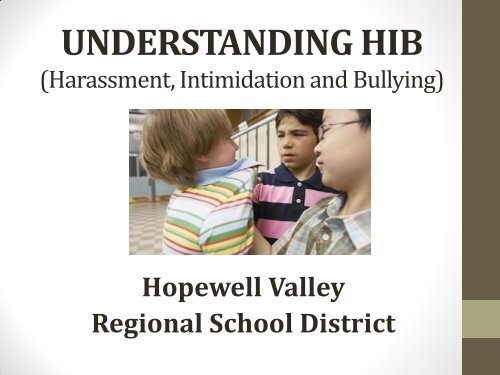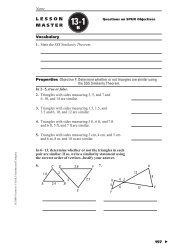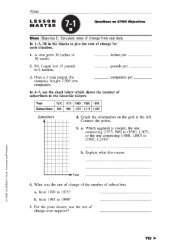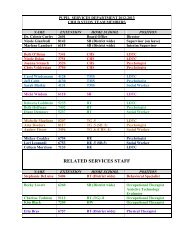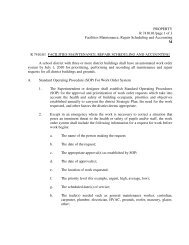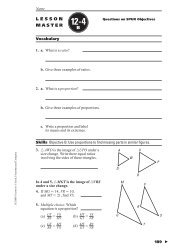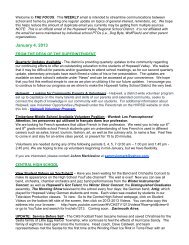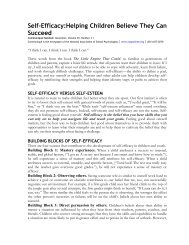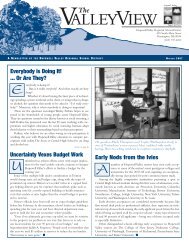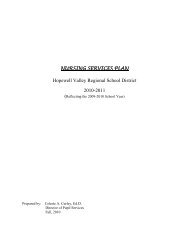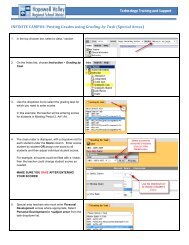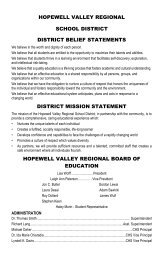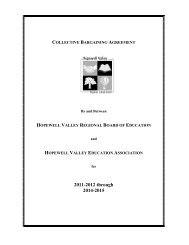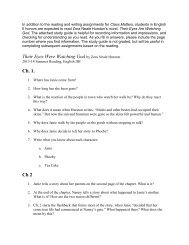Presentation: Understanding Harassment, Intimidation, and Bullying
Presentation: Understanding Harassment, Intimidation, and Bullying
Presentation: Understanding Harassment, Intimidation, and Bullying
You also want an ePaper? Increase the reach of your titles
YUMPU automatically turns print PDFs into web optimized ePapers that Google loves.
NEW LAW• January 5, 2011 Governor Christie signedinto law the “Anti-<strong>Bullying</strong> Bill of Rights”• New law goes into effect September 2011• Amends the 2002 anti-bullying law
KEY ISSUES IN NEW LAW• New definition of bullying• Clarifies responsibility for conduct away fromschool grounds• Creates School Safety Teams• Requires Anti-<strong>Bullying</strong> Specialist in every school• Requires Anti-<strong>Bullying</strong> Coordinator for district• New investigation, reporting, discipline, appealprocedures
KEY ISSUES IN NEW LAW (cont’d)• New state reporting requirements onincidents of bullying• New grading procedure for schools <strong>and</strong>districts• New training requirements• Clarifies instances where school employeesmay be subject to disciplinary action
NEW DEFINITION“<strong>Harassment</strong>, <strong>Intimidation</strong> or <strong>Bullying</strong>”(“HIB”)TYPES OF BEHAVIORS:• Includes ANY gesture, or• ANY written, verbal or physical act, or• ANY electronic communication• Can be a single incident or series ofincidents
DEFINITION (cont’d)Motivation for HIB Behavior:• ANY actual OR PERCEIVED characteristic• EXAMPLES: race, color, religion, ancestry,national origin, gender, sexual orientation,gender identity <strong>and</strong> expression, ormental/physical/sensory disability, or ANYOTHER DISTINGUISHING CHARACTERISTIC
DEFINITION (cont’d)LOCATION OF INCIDENT:• On school property• At school-sponsored functions• On a school bus• Off school grounds (including cyberspace)
DEFINITION (cont’d)MUST MEET ONE OF THE FOLLOWINGCONDITIONS in addition to causing substantialdisruption or interference:• Has effect of insulting or demeaningstudent or group of students OR• Creates hostile educational environment forstudent by interfering with student’seducation OR severely or pervasivelycausing physical or emotional harm tostudent
REVISED LANGUAGE,BUT SIMILAR LEGALSTANDARD• Clarifies need for threshold showingsubstantial disruption with operation ofschool or rights of student, already truebased on case law• Clarifies single incident or series, but alreadytrue based on case law• Clarifies emotional or physical harm, butalready true based on case law
SIMILAR LEGAL STANDARD(cont’d)• Clarifies incident could be off school grounds,already true based on case law• Creates new term “hostile educationalenvironment,” but still requires thresholdshowing of substantial disruption first
ANTI-BULLYING COORDINATOR• Appointed by Superintendent• Coordinates/strengthens district HIB policy toprevent, identify, <strong>and</strong> address HIB Collaborateswith anti-bullying specialists, BOE <strong>and</strong> Supt.• Meets at least twice per school year with theanti-bullying specialists• Provides data, in collaboration with the supt.to the NJDOE• Performs other related duties
ANTI-BULLYING SPECIALIST• Chairs the school safety team• Leads the investigation of reported HIB• Acts as the primary school official responsiblefor preventing, identifying, <strong>and</strong> addressingincidents of HIB in the school• Assists the principal in appropriately applyingthe range of ways for responding to HIBestablished by the school board• Provides input to local school board on annualre-evaluation, reassessment, review of policy
SCHOOL SAFETY TEAM• Formed to develop, foster, <strong>and</strong> maintain apositive school climate, including HIB issues• Meets at least 2 times per school year• Consists of the principal (or designee, preferablya senior administrator) <strong>and</strong> principal appointees:a teacher in the school, the school anti-bullyingspecialist (serves as chair), a parent/guardian ofa student in the school, <strong>and</strong> other membersdetermined by the principal
WHAT IS BULLYING?
DISTINGUISHING CONFLICTSNormal Conflict…• Involves people with similardegrees of power• Involves a mutual disagreementor difference in interests or goals• Is reciprocal; both partiesparticipate in the conflict• Both parties are responsible forwrongdoing• Can be fairly resolved bycompromise or negotiation<strong>Bullying</strong>…• Involves an imbalance of power• Involves one party exerting theirneeds or interests• Is one-sided; one party instigates• Involves hurtful behavior onbehalf of one party againstanother• Bully is responsible forwrongdoing• A fair resolution involves achange in the behavior of thebully; the target has noconcession to make• Does not become normal conflictif the target retaliates in defense
TYPES OF BULLYING•Physical bullying• punching, shoving, acts that hurt people• Verbal bullying• name calling, teasing, making offensive remarks
TYPES OF BULLYING• Indirect bullying• spreading rumors• keeping certain people out of the “group”• getting certain people to “gang up” on others• Cyber bullying• sending insulting messages bye-mail, text messaging, chat rooms, etc.
WARNING SIGNS OF BULLYINGHow do you know if your child is engaging inbullying behavior?Ask yourself…Has my child ever been accused of being a bully at school orelsewhere?Has my child gotten into trouble for fighting (physically orverbally) with other children at school?Does my child become easily frustrated, defiant or oppositionalwhen he does not get his way?
WARNING SIGNS OF BULLYING(cont’d)Who are my child’s friends? How does my child interact withothers? Have I witnessed my child with other children? Is shedominant or aggressive?What does my child do with spare time? What are my child’shobbies?Does my child speak about other children as “stupid” or useother negative terms to describe others?Does my child talk about certain children “deserving” badthings to happen to them or showing little concern for othersin bad situations?
WHAT YOU CAN DO IF YOU SUSPECTYOUR CHILD IS BULLYING OTHERSDiscuss school rules <strong>and</strong> behavior expectations with your child Find out exactly what it is that your child has been doing.What has your child been accused of doing? What does yourchild admit to doing?Talk to your child, calmly, about why she is engaging in suchbehaviors. It is important that you not approach your child inan accusatory or confrontational toneSome children may feel pressure to participate in bullyingbehavior in order to fit in with peers or to avoid being bulliedthemselves
WHAT YOU CAN DO IF YOU SUSPECTYOUR CHILD IS BULLYING (cont’d)Explain how bullying affects others (targets, byst<strong>and</strong>ers, school climate)Discuss alternatives to aggressive behaviorRole playing may help some children to underst<strong>and</strong> how it feels to bebulliedTeach your child to show tolerance for those who are different.Model this behavior yourselfPraise your child for using alternative, appropriate behavior Establish consequences for negative behaviors, such as losing privileges(consequences should be nonphysical in nature)
WHAT YOU CAN DO IF YOU SUSPECTYOUR CHILD IS BULLYING (cont’d)Ensure appropriate adult supervision at all times. Be aware of your child’s involvement in activitiesinside <strong>and</strong> outside of schoolReport any incidents of bullying behaviors toschool officials, even if your child is the oneengaging in those behaviors Seek outside help
HOW DO YOU KNOW IF YOURCHILD IS BEING BULLIED?Does my child fear going to school?Has my child been out sick a lot?Visible bruises: Have I noticed bruises on my child?When I ask my child about the bruises, what is theresponse?Does my child have friends? Who are they? Have Iseen the way that they interact?Is my child submissive or withdrawn with otherchildren?
.HOW DO YOU KNOW IF YOURCHILD IS BEING BULLIED? (cont’d)Does my child seem unhappy or insecure or havelow self-esteem?Does my child talk about “nobody liking her” or “nothaving any friends?”Does my child talk about wanting to hurt someoneor get back at someone?Does my child have difficulty being assertive whenit’s necessary?
WHAT YOU CAN DO IF YOUR CHILDIS BEING BULLIEDDo not confront the suspected bully or bullies on your own.Talk to a school administrator about the situation.Ask your child what takes place in school, what happenswhen there is free time, how they are feeling.Role play with your child <strong>and</strong> discuss ways they can respondto a bully (e.g. walking away, telling an adult, or asking forhelp from peers.)Teach your child that telling on those who bully should notbe considered tattlingLet your child know that by reporting bullying, help willcome <strong>and</strong> that support will come from you <strong>and</strong> from theschool staff.
WHAT YOU CAN DO IF YOUR CHILDIS BEING BULLIED (cont’d)Encourage your child to talk with friends about bullyingBullies rarely target kids in groups, so your child shouldmaintain a peer group that is unifiedEnsure appropriate adult supervision at all timesBe aware of your child’s involvement in activities inside<strong>and</strong> outside of schoolReport any incidents of bullying behaviors, even if yourchild is not the target of such behavior, to schoolofficialsSeek outside help
Hopewell ValleyANTI-BULLYING SPECIALISTS609-737-4000• Bear Tavern: Kevin Kirwan, X 5703• Hopewell Elementary: Amy Parker, X 7135• Stony Brook: Terri Stimmler, X 6041• Toll Gate: Christine D’Avirro, X 8245• Timberlane: Cecelia Cardano, X 4125• Central High: Joanna Strauch, X 3524• District Anti-<strong>Bullying</strong> Coordinator: Rich Lang X2401


